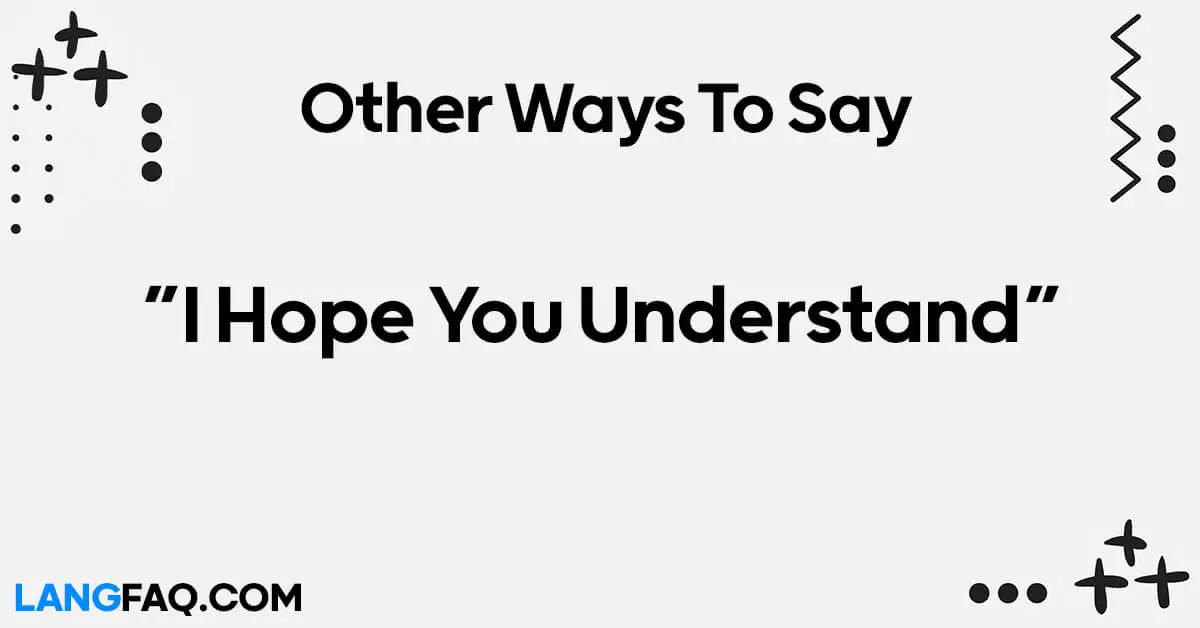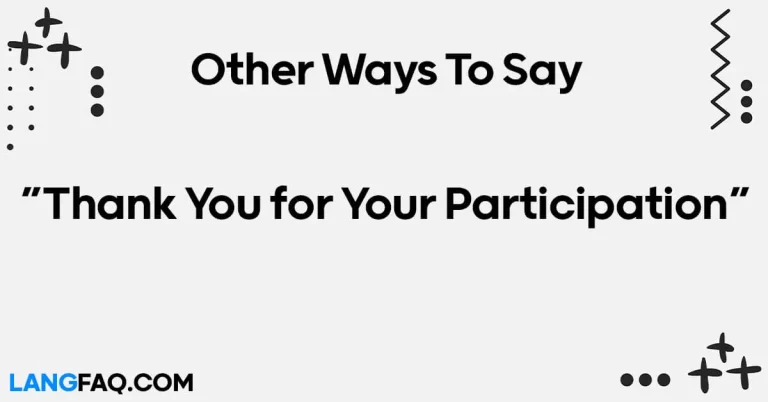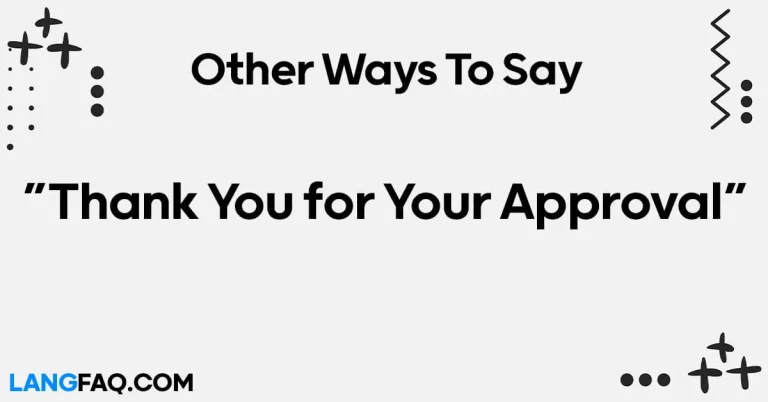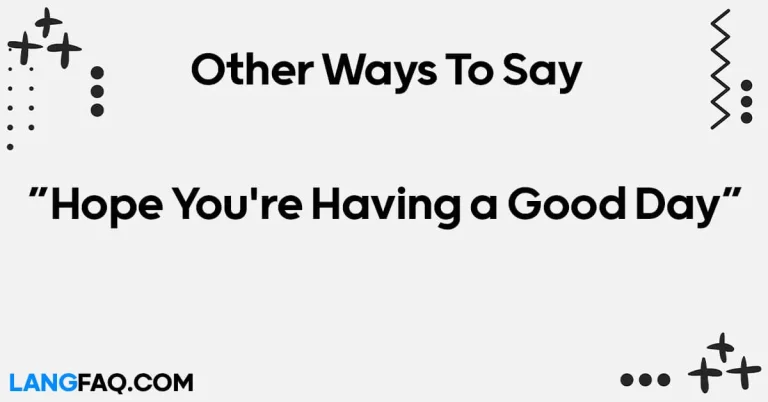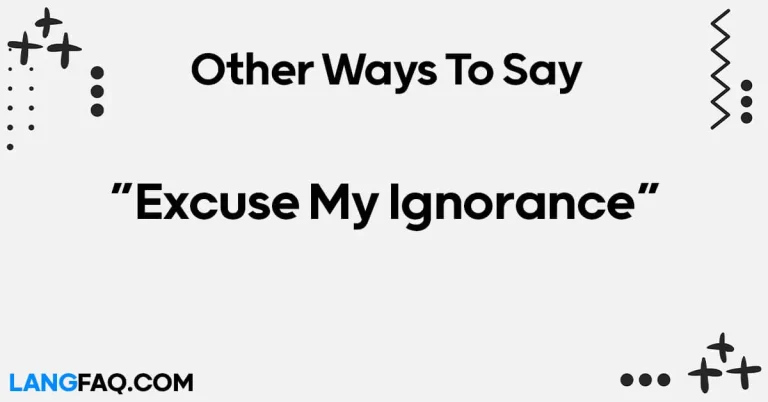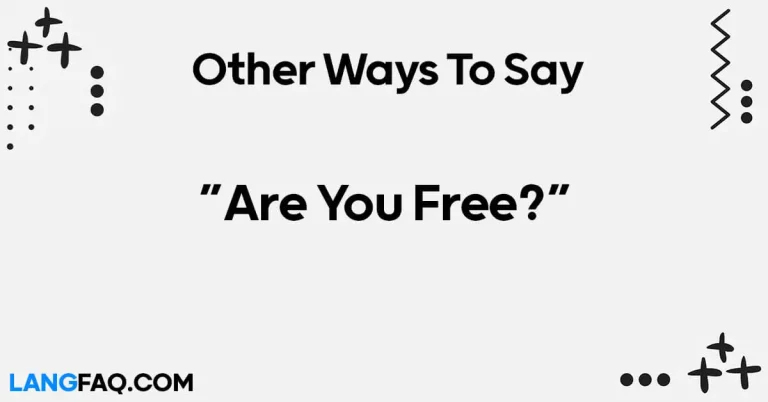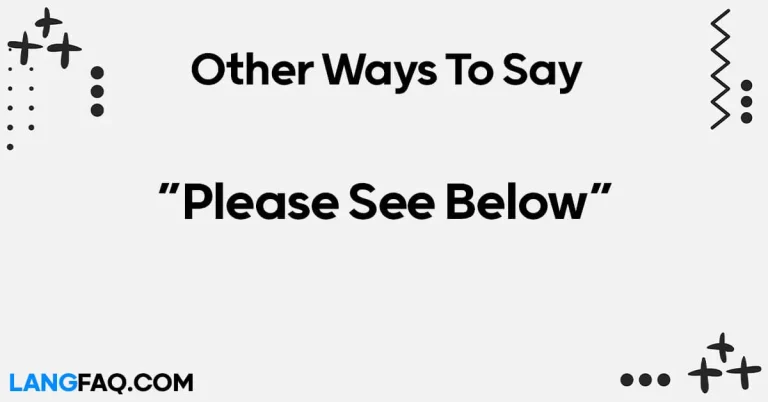Welcome to a journey of enriched communication! In this guide, we’ll delve into various alternatives to convey understanding, providing you with valuable insights to improve your expressive abilities. Mastering diverse phrases for expressing comprehension not only broadens your vocabulary but also fosters effective communication. Let’s explore the multifaceted ways to say “I hope you understand.”
12 Other Ways to Say “I Hope You Understand”
Here are 12 other ways to say “I Hope You Understand”:
- I Trust You Grasp My Perspective
- Hoping for Your Full Comprehension
- Counting on Your Insight
- Wishing You See Where I’m Coming From
- I’m Confident You Get My Point
- Anticipating Your Complete Grasp
- Optimistic You Catch My Drift
- Expecting Mutual Understanding
- Having Faith in Your Understanding
- Believing You’re On the Same Page
- Assuming You’ve Caught the Essence
- Looking Forward to Your Understanding
| Expression | Meaning | Example |
|---|---|---|
| I Trust You Grasp My Perspective | Expressing confidence in the other’s understanding | After explaining my situation, I trust you grasp my perspective. |
| Hoping for Your Full Comprehension | A wish for complete understanding | I’m sharing my thoughts, hoping for your full comprehension. |
| Counting on Your Insight | Relying on the other’s valuable perspective | Counting on your insight to navigate this situation. |
| Wishing You See Where I’m Coming From | Desire for the other to understand your viewpoint | I’m sharing my experiences, wishing you see where I’m coming from. |
| I’m Confident You Get My Point | Asserting confidence in the other’s understanding | Clarifying my stance, I’m confident you get my point. |
| Anticipating Your Complete Grasp | Expecting thorough understanding | Explaining the details, anticipating your complete grasp. |
| Optimistic You Catch My Drift | Positive outlook on the other’s understanding | Describing the scenario, optimistic you catch my drift. |
| Expecting Mutual Understanding | Anticipating shared comprehension | In this discussion, expecting mutual understanding. |
| Having Faith in Your Understanding | Trusting the other’s ability to comprehend | Sharing my thoughts, having faith in your understanding. |
| Believing You’re On the Same Page | Conviction that both parties share understanding | Summarizing our discussion, believing you’re on the same page. |
| Assuming You’ve Caught the Essence | Making an assumption about understanding | Explaining the concept, assuming you’ve caught the essence. |
| Looking Forward to Your Understanding | Eager anticipation for the other’s comprehension | Presenting my perspective, looking forward to your understanding. |
These alternatives provide a rich tapestry of expressions to convey understanding effectively. Whether expressing confidence, optimism, or reliance, these phrases cater to various communication nuances, fostering deeper connections in conversations.
Is It Correct to Say “I Hope You Understand”?
Yes, “I hope you understand” is a commonly used and grammatically correct expression. It is a polite and considerate way to convey that you wish the other person comprehends or empathizes with the information or situation you have presented.
This phrase is appropriate in various contexts, such as:
- Apologies: “I’m sorry for the inconvenience. I hope you understand.”
- Explanations: “Given the circumstances, I hope you understand the need for these changes.”
- Requests: “I won’t be able to make it to the meeting. I hope you understand.”
- Sharing Perspectives: “Expressing my viewpoint, I hope you understand where I’m coming from.”
However, it’s essential to consider the tone and context when using this phrase. While it is generally polite, in some situations, providing additional context or using alternative expressions from the list provided in the article might be more effective in conveying your message. Always be mindful of the specific circumstances and the relationship you have with the person you are communicating with.
Professional Mail Example With “I Hope You Understand”
Subject: Changes to Meeting Schedule
Dear [Recipient’s Name],
I trust this email finds you well. I am writing to inform you about some adjustments to our upcoming meeting schedule.
Due to unforeseen circumstances, we have had to reschedule the meeting originally set for [previous date and time]. The new date is [new date], and the time remains [unchanged/adjusted to new time].
I hope you understand that these changes were necessary to accommodate [provide brief explanation, if applicable, such as a conflicting engagement or urgent matter].
Your flexibility and understanding in this matter are highly appreciated. If you have any concerns or if the new schedule poses any challenges, please do not hesitate to reach out. We are committed to ensuring that this adjustment causes minimal disruption to your schedule.
Thank you for your cooperation and understanding. We look forward to your continued support in maintaining the efficiency of our collaborative efforts.
Best regards,
[Your Full Name] [Your Position] [Your Company] [Contact Information]
1. I Trust You Grasp My Perspective:
In the realm of effective communication, expressing trust in someone’s understanding can deepen connections and foster mutual respect. Using the phrase “I Trust You Grasp My Perspective” goes beyond a simple hope, conveying confidence in the other person’s ability to comprehend your viewpoint.
Usage in Formal Context: In a professional setting, when discussing a complex project strategy with a colleague, you might say, “Considering the intricacies involved, I trust you grasp my perspective on how crucial the timelines are for successful implementation.”
Usage in Informal Context: In a casual conversation with a friend about personal experiences, you could express, “Recalling my journey, I trust you grasp my perspective on why those moments were so impactful.”
Variations:
- “I’m confident you understand my viewpoint.”
- “I believe you’re following my perspective accurately.”
Example Email Snippet:
Subject: Seeking Your Insight on Project Timeline
Dear [Colleague’s Name],
As we navigate the challenges of the upcoming project, I wanted to discuss the proposed timeline. Considering your expertise in similar projects, I trust you grasp my perspective on the critical importance of adhering to the deadlines for overall success.
Looking forward to our discussion.
Best regards, [Your Name]
2. Hoping for Your Full Comprehension:
Expressing a wish for complete understanding is a courteous way to convey your expectations in a conversation. “Hoping for Your Full Comprehension” sets a positive tone while emphasizing the significance of the information being shared.
Usage in Formal Context: During a business presentation, you might state, “In light of the upcoming changes, I’m hoping for your full comprehension of the strategic shifts and their impact on our operations.”
Usage in Informal Context: Discussing personal matters with a friend, you could express, “Reflecting on recent events, I’m hoping for your full comprehension of why certain decisions were made.”
Variations:
- “I trust you fully understand the implications.”
- “Your complete understanding is essential.”
Example Email Snippet:
Subject: Briefing on Recent Developments
Dear [Recipient’s Name],
As we prepare for the changes ahead, I’m sharing a brief overview to ensure everyone is on the same page. Hoping for your full comprehension of the nuances involved.
Thank you for your attention.
Best regards, [Your Name]
3. Counting on Your Insight:
Relying on someone’s valuable perspective is a powerful way to acknowledge their expertise. “Counting on Your Insight” not only expresses trust but also highlights the significance of the other person’s viewpoint.
Usage in Formal Context: In a team meeting, you might convey, “As we strategize for the upcoming quarter, I’m counting on your insight into market trends to guide our decision-making.”
Usage in Informal Context: During a friendly discussion, you could say, “Planning the trip, I’m counting on your insight into the best local spots to make it an unforgettable experience.”
Variations:
- “Your valuable perspective is crucial.”
- “I rely on your insight for informed decisions.”
Example Email Snippet:
Subject: Seeking Your Input on Project Approach
Dear [Team Member’s Name],
As we refine our approach for the next phase, I’m counting on your insight into the specific challenges we might encounter. Your perspective will be invaluable in shaping our strategy.
Looking forward to your input.
Best regards, [Your Name]
4. Wishing You See Where I’m Coming From:
Expressing a desire for the other person to understand your perspective can foster empathy and open communication channels. “Wishing You See Where I’m Coming From” adds a personal touch to your expression of understanding.
Usage in Formal Context: In a meeting discussing differing opinions, you might express, “Considering the diverse viewpoints, I’m wishing you see where I’m coming from regarding the proposed changes.”
Usage in Informal Context: In a family discussion about future plans, you could say, “Reflecting on my choices, I’m wishing you see where I’m coming from and why these decisions matter to me.”
Variations:
- “I hope you grasp the rationale behind my stance.”
- “Wishing for understanding from your perspective.”
Example Email Snippet:
Subject: Clarification on Proposed Amendments
Dear [Recipient’s Name],
I wanted to provide additional context on the proposed amendments. Wishing you see where I’m coming from and how these changes align with our overarching goals.
Appreciate your consideration.
Best regards, [Your Name]
5. I’m Confident You Get My Point:
Asserting confidence in the other person’s understanding injects a sense of assurance into the conversation. “I’m Confident You Get My Point” signals clarity and leaves little room for misinterpretation.
Usage in Formal Context: In a negotiation meeting, you might state, “After clarifying the terms, I’m confident you get my point on the mutually beneficial aspects of this agreement.”
Usage in Informal Context: Discussing plans with a friend, you could express, “Explaining the itinerary, I’m confident you get my point about the exciting opportunities this trip presents.”
Variations:
- “I trust you’ve comprehended the essence of my message.”
- “Confident that my perspective is clear to you.”
Example Email Snippet:
Subject: Finalizing Project Proposal
Dear [Client’s Name],
Following our discussion, I’m confident you get my point regarding the strategic advantages outlined in the project proposal. Looking forward to your feedback.
Best regards, [Your Name]
6. Anticipating Your Complete Grasp:
Expressing anticipation for the other person’s complete understanding is a courteous way to signal the importance of the upcoming information. “Anticipating Your Complete Grasp” sets a positive tone for the exchange.
Usage in Formal Context: In a training session, you might convey, “As we delve into the new procedures, I’m anticipating your complete grasp of the intricacies involved in implementing these changes.”
Usage in Informal Context: Discussing a personal matter with a close friend, you could say, “Sharing my experiences, I’m anticipating your complete grasp of the emotions tied to these memories.”
Variations:
- “Looking forward to your full understanding.”
- “I expect you’ll fully comprehend the details.”
Example Email Snippet:
Subject: Training Session Agenda
Dear [Team Member’s Name],
As we prepare for the upcoming training session, I’m sharing the agenda in advance. Anticipating your complete grasp of the key concepts discussed.
Thank you for your attention.
Best regards, [Your Name]
7. Optimistic You Catch My Drift:
Infusing optimism into your expression of understanding adds a positive dimension to the conversation. “Optimistic You Catch My Drift” communicates hope and confidence in the other person’s ability to grasp the intended message.
Usage in Formal Context: During a team briefing, you might express, “Discussing the project’s goals, I’m optimistic you catch my drift on the overarching vision and its impact.”
Usage in Informal Context: In a friendly discussion about plans, you could say, “Outlining our weekend agenda, I’m optimistic you catch my drift on the excitement these activities hold.”
Variations:
- “Confident you’ll pick up on the key points.”
- “Optimistic about your understanding of the main concepts.”
Example Email Snippet:
Subject: Key Points from Today’s Meeting
Dear [Team],
As we wrap up today’s meeting, I’m sending a summary of the key points discussed. Optimistic you catch my drift on the priorities moving forward.
Best regards, [Your Name]
8. Expecting Mutual Understanding:
Highlighting the expectation of shared comprehension emphasizes collaboration and mutual respect. “Expecting Mutual Understanding” fosters an environment where both parties actively engage in the exchange of ideas.
Usage in Formal Context: In a collaborative project discussion, you might state, “Reviewing the project milestones, I’m expecting mutual understanding on the individual responsibilities and the overall timeline.”
Usage in Informal Context: Discussing plans with a family member, you could express, “Planning the family event, I’m expecting mutual understanding of everyone’s preferences to make it enjoyable for all.”
Variations:
- “Anticipating a shared understanding.”
- “Hoping for a mutual grasp of the situation.”
Example Email Snippet:
Subject: Collaborative Decision-Making
Dear [Team],
As we embark on this collaborative effort, I’m sharing the proposed plan. Expecting mutual understanding and open discussions to refine our approach.
Looking forward to your insights.
Best regards, [Your Name]
9. Having Faith in Your Understanding:
Expressing faith in someone’s understanding goes beyond mere expectation, showcasing a deeper level of trust. “Having Faith in Your Understanding” conveys confidence in the other person’s ability to grasp complex concepts.
Usage in Formal Context: In a mentor-mentee conversation, you might express, “Guiding you through the project specifics, I’m having faith in your understanding and application of these strategies.”
Usage in Informal Context: Discussing personal goals with a friend, you could say, “Sharing my aspirations, I’m having faith in your understanding of the challenges and triumphs I might encounter.”
Variations:
- “Believing in your capacity to comprehend.”
- “Having confidence in your understanding.”
Example Email Snippet:
Subject: Mentorship Session Agenda
Dear [Mentee’s Name],
As we prepare for our mentorship session, I’m outlining the agenda. Having faith in your understanding and eagerness to learn.
Best regards, [Your Name]
10. Believing You’re On the Same Page:
Emphasizing shared understanding is crucial in collaborative environments. “Believing You’re On the Same Page” reinforces unity and alignment, ensuring everyone is moving forward with a unified vision.
Usage in Formal Context: In a team meeting discussing project objectives, you might state, “Reviewing our goals, I’m believing we’re on the same page regarding the strategic priorities and desired outcomes.”
Usage in Informal Context: Planning an event with friends, you could express, “Organizing the details, I’m believing we’re on the same page about creating an inclusive and enjoyable experience for everyone.”
Variations:
- “Confident we’re in agreement on the key aspects.”
- “Believing we share a common understanding.”
Example Email Snippet:
Subject: Confirming Project Milestones
Dear [Team],
As we approach the upcoming milestones, I’m sending a confirmation of our objectives. Believing we’re on the same page regarding our collective goals.
Appreciate your commitment.
Best regards, [Your Name]
11. Assuming You’ve Caught the Essence:
While assumptions should be used cautiously, expressing confidence in someone’s understanding can expedite decision-making. “Assuming You’ve Caught the Essence” implies a shared understanding without undermining the importance of clarity.
Usage in Formal Context: In a presentation, you might state, “Elaborating on the market trends, I’m assuming you’ve caught the essence of our approach to stay competitive in this industry.”
Usage in Informal Context: Discussing personal preferences, you could express, “Describing my tastes, I’m assuming you’ve caught the essence of what makes these choices meaningful to me.”
Variations:
- “Presuming you’ve grasped the main points.”
- “Assuming a shared understanding of the core concepts.”
Example Email Snippet:
Subject: Recap of Strategy Meeting
Dear [Team],
Recapping our strategy meeting, I’m assuming you’ve caught the essence of our approach. Please feel free to reach out for any clarifications.
Best regards, [Your Name]
12. Looking Forward to Your Understanding:
Expressing eagerness for the other person’s understanding adds a positive and forward-looking element to the conversation. “Looking Forward to Your Understanding” invites collaboration and signals an open dialogue.
Usage in Formal Context: In a project update, you might express, “Presenting the findings, I’m looking forward to your understanding of the implications and potential strategies moving forward.”
Usage in Informal Context: Discussing personal plans, you could say, “Sharing my vision, I’m looking forward to your understanding of the motivations behind my decisions.”
Variations:
- “Eagerly anticipating your comprehension.”
- “Excited about the prospect of you understanding.”
Example Email Snippet:
Subject: Insights on Market Trends
Dear [Recipient’s Name],
Sharing insights on recent market trends. Looking forward to your understanding of how these findings can shape our next steps.
Appreciate your insights.
Best regards, [Your Name]
FAQs
Q: Can I use these alternatives in professional settings? Absolutely! These alternatives are versatile and can be adapted to various contexts, including professional environments. Tailor your expressions to suit the tone of the conversation.
Q: Are these phrases suitable for written communication? Certainly! Whether spoken or written, these alternatives can enhance your communication skills in any medium.
Q: How can I remember these alternatives easily? Consider practicing these phrases in everyday conversations to make them a natural part of your communication repertoire.
Q: Is it essential to use alternatives in every conversation? While not mandatory, incorporating variety in your expressions can make your communication more engaging and dynamic.
Q: Can these alternatives be used in cross-cultural communication? Yes, these phrases are designed to convey understanding universally, making them suitable for cross-cultural communication.
Q: Are there situations where a simple “I hope you understand” is more appropriate? Certainly, simplicity has its own merit. Use these alternatives based on the context and the depth of understanding you wish to convey.
Conclusion:
Elevate your communication game with these 12 other ways to say “I hope you understand.” Tailor your expressions to suit various situations, fostering meaningful connections. Effective communication is the key to thriving relationships and personal growth.

